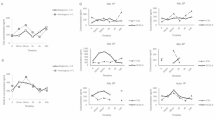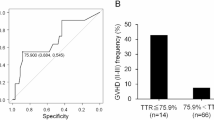Summary:
We conducted an open-label, multicenter, single-arm clinical trial to investigate the safety and efficacy of drotrecogin alfa (activated) (Drot AA) in hematopoietic stem cell transplant (HSCT) patients with severe sepsis. Drot AA was administered as a continuous i.v. infusion of 24 μg/kg/h for 96 h. The target enrollment was 250 patients in 15–20 transplant centers over a 2-year period (March 2003–March 2005). However, after only 10 months, in December 2003, the trial was stopped due to a low enrollment of seven patients at three of the 15 sites that were open for accrual. Six of the seven patients completed the drug infusion. Two patients experienced serious bleeding events. The first patient developed a nonfatal diffuse alveolar hemorrhage 2 days after study-drug completion. The second patient had severe coagulopathy and developed a fatal intracranial hemorrhage on the third day of drug infusion. Three of the seven patients were alive 100 days after the HSCT. The slow enrollment rate was attributed to changes in transplant preparatory regimens, enhancements in antimicrobial prophylactic protocols and the use of antimicrobial-coated catheters. The small number of patients in this report precludes a definitive assessment of the safety and efficacy of Drot AA in HSCT patients.
This is a preview of subscription content, access via your institution
Access options
Subscribe to this journal
Receive 12 print issues and online access
$259.00 per year
only $21.58 per issue
Buy this article
- Purchase on SpringerLink
- Instant access to full article PDF
Prices may be subject to local taxes which are calculated during checkout
Similar content being viewed by others
References
Macias WL, Nelson DR . Severe protein C deficiency predicts early death in severe sepsis. Crit Care Med 2004; 32 (Suppl.): S223–S228.
Bernard GR, Vincent JL, Laterre PF et al. Efficacy and safety of recombinant human activated protein C for severe sepsis. N Engl J Med 2001; 344: 699–709.
Crawford SW, Petersen FB . Long-term survival from respiratory failure after marrow transplantation for malignancy. Am Rev Respir Dis 1992; 145: 510–514.
Jackson SR, Tweeddale MG, Barnett MJ et al. Admission of bone marrow transplant recipients to the intensive care unit: outcome, survival and prognostic factors. Bone Marrow Transplant 1998; 21: 697–704.
Faber-Langendoen K, Caplan AL, McGlave PB . Survival of adult bone marrow transplant patients receiving mechanical ventilation: a case for restricted use. Bone Marrow Transplant 1993; 12: 501–507.
Khassawneh BY, White Jr P, Anaissie E . Outcome from mechanical ventilation after autologous peripheral blood stem cell transplantation. Chest 2002; 121: 185–188.
Bach PB, Schrag D, Nierman DM et al. Identification of poor prognostic features among patients requiring mechanical ventilation after hematopoietic stem cell transplantation. Blood 2001; 98: 3234–3240.
Soubani AO, Kseibi E, Bander JJ et al. Outcome and prognostic factors of hematopoietic stem cell transplantation recipients admitted to a medical ICU. Chest 2004; 126: 1604–1611.
Haire WD, Ruby EI, Gordon BG et al. Multiple organ dysfunction syndrome in bone marrow transplantation. JAMA 1995; 274: 1289–1295.
Pihusch M . Bleeding complications after hematopoietic stem cell transplantation. Semin Hematol 2004; 41 (Suppl. 1): 93–100.
Pastores SM, Papadopoulos E, van den Brink M et al. Septic shock and multiple organ failure after hematopoietic stem cell transplantation: treatment with recombinant human activated protein C. Bone Marrow Transplant 2002; 30: 131–134.
Nevo S, Swan V, Enger C et al. Acute bleeding after bone marrow transplantation (BMT) – incidence and effect on survival. A quantitative analysis in 1402 patients. Blood 1998; 91: 1469–1477.
Graus F, Saiz A, Sierra J et al. Neurologic complications of autologous and allogeneic bone marrow transplantation in patients with leukemia: a comparative study. Neurology 1996; 46: 1004–1009.
Villela L, Sureda A, Canals C et al. Low transplant related mortality in older patients with hematologic malignancies undergoing autologous stem cell transplantation. Haematologica 2003; 88: 300–305.
Boyiadzis M, Pavletic S . Haematopoietic stem cell transplantation: indications, clinical developments and future directions. Expert Opin Pharmacother 2004; 5: 97–108.
Ramphal R . Changes in the etiology of bacteremia in febrile neutropenic patients and the susceptibilities of the currently isolated pathogens. Clin Infect Dis 2004; 39: S25–S31.
Collin BA, Leather HL, Wingard JR et al. Evolution, incidence, and susceptibility of bacterial bloodstream isolates from 519 bone marrow transplant patients. Clin Infect Dis 2001; 33: 947–953.
Brown JM . Fungal infections in bone marrow transplant patients. Curr Opin Infect Dis 2004; 17: 347–352.
Walsh TJ, Pappas P, Winston DJ et al. Voriconazole compared with liposomal amphotericin B for empirical antifungal therapy in patients with neutropenia and persistent fever. N Engl J Med 2002; 346: 225–234.
Hanna HA, Raad II, Hackett B et al. Antibiotic-impregnated catheters associated with significant decrease in nosocomial and multidrug-resistant bacteremias in critically ill patients. Chest 2003; 124: 1030–1038.
Hotchkiss RS, Karl IE . The pathophysiology and treatment of sepsis. N Engl J Med 2003; 348: 138–150.
Whitehead J . Stopping clinical trials by design. Nat Rev Drug Discov 2004; 3: 973–977.
Psaty BM, Rennie D . Stopping medical research to save money: a broken pact with researchers and patients. JAMA 2003; 289: 2128–2131.
ICH Harmonised Tripartite Guideline. Statistical principles for clinical trials. International Conference on Harmonisation E9 Expert Working Group. Stat Med 1999; 18: 1905–1942.
Acknowledgements
We thank Dr Ann Jakubowski from Memorial Sloan-Kettering Cancer Center for manuscript review.
Funding source: Eli Lilly & Company.
Author information
Authors and Affiliations
Corresponding author
Rights and permissions
About this article
Cite this article
Pastores, S., Shaw, A., Williams, M. et al. A safety evaluation of drotrecogin alfa (activated) in hematopoietic stem cell transplant patients with severe sepsis: lessons in clinical research. Bone Marrow Transplant 36, 721–724 (2005). https://doi.org/10.1038/sj.bmt.1705124
Received:
Accepted:
Published:
Issue date:
DOI: https://doi.org/10.1038/sj.bmt.1705124
Keywords
This article is cited by
-
Drotrecogin alfa activated as a treatment for severe sepsis in pediatric cancer
Bone Marrow Transplantation (2006)



